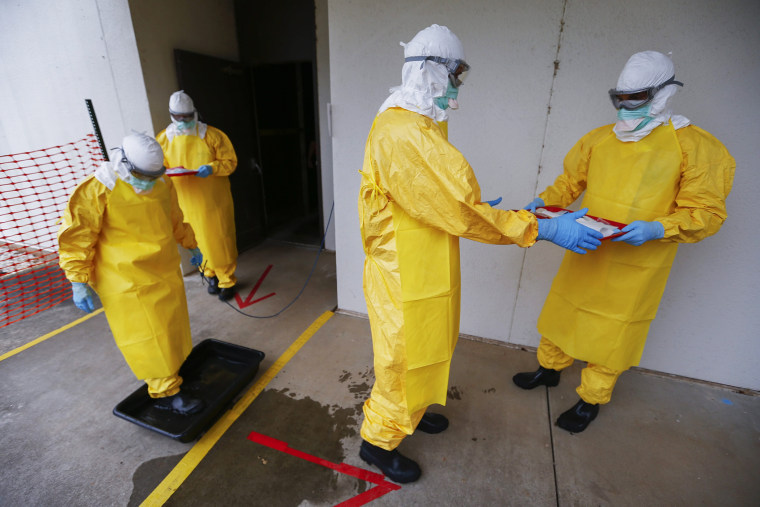It wasn't long ago -- in fact, it was last month -- that congressional Republicans invested considerable energy in condemning President Obama's efforts to combat ISIS. GOP lawmakers were generally vague about what it was they didn't like, and they made no real effort to do any actual work on the subject.
Substantive policy concerns, however, weren't the point. Republicans saw value in Americans being terrified, so they exploited public anxiety to advance their political ambitions however possible.
If this sounds familiar, it's because the same dynamic is unfolding again. The GOP is somehow trying to blame President Obama for the Ebola virus, in the hopes that the public (i.e., likely 2014 voters) are so overwhelmed by fear that rational thought will no longer matter. The future of this public-health threat will remain entirely unaffected by the number of Republicans in Congress, but a panicked population isn't supposed to think these things through. The message is intended to be more primal: if you're afraid, rally behind those telling you to be scared.
But while GOP lawmakers balked at any kind of ISIS-related legislation, Republicans are apparently interested in one specific policy: imposing a travel ban on West African nations. Rep. Dennis Ross (R-Fla.) will reportedly "introduce legislation to ban travel between the U.S. and West African countries" in order to prevent Ebola "from further infiltrating our homeland."
It's safe to assume the bill will enjoy overwhelming support, and will probably even pick up Democratic backers, but if there is some kind of credible legislative debate, I hope this National Review article, written by a medical doctor, is considered in detail.
[F]irst and foremost, although we are members of the world health community, we must worry about our own public psyche here in the United States. If our leaders can't give us a sense that we are protected, we must achieve it by imposing a ban. [...] I'm not convinced medically -- I don't believe that a travel ban against the Ebola-afflicted countries in West Africa will be particularly effective, it may even be counterproductive, and it certainly isn't coming from the strongest side of what being an American means. But as fear of Ebola and fear of our leaders' ineptitude grows, I think we must have a ban to patch our battered national psyche.
It's amazing to Stephen Colbert's "truthiness" thesis come to life: it doesn't matter what is true; what matters is what feels true. A travel ban won't succeed in its intended goal, and such a response "may even be counterproductive," but we should do it anyway. Why? Because it'll help our "psyche," even it doesn't help our public-health crisis.
We elect policymakers to enact policies in precisely the opposite way, but it appears "truthiness" is ruling the day.
The result is discouraging. A travel ban won't help. Really, it won't help. This might have some impact on our "psyche," but even that's unlikely.
Why? Because Republicans have, for the first time in the history of American democracy, made an infectious disease a campaign theme. If President Obama approved a travel ban this very second, it wouldn't change the fact that the GOP wants the public to be in a constant state of fear -- msnbc's Benjy Sarlin reports from New Hampshire today that the politicization of Ebola is "just nonstop" -- and that the right would come up with an even less effective demand to replace this one.
The bottom line, however, remains the same: the Politics of Fear may deliver electoral gains, but Republican policymaking won't make a bit of difference, and may even make conditions worse.
